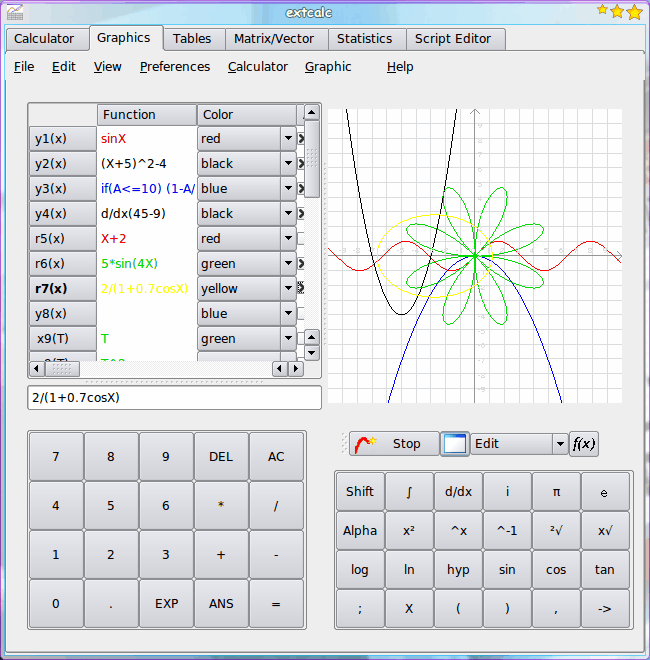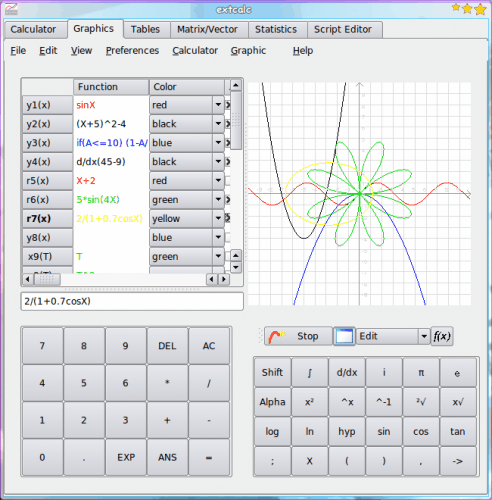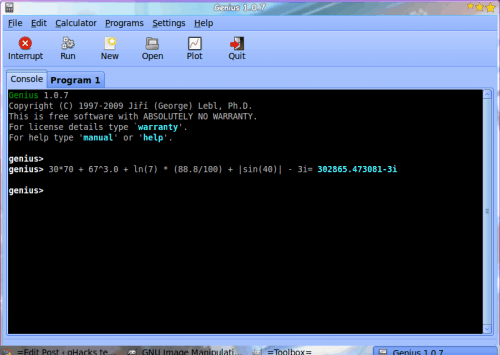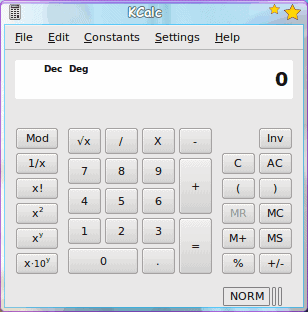Three calculators for the Linux desktop

To many, geek = math && nerd = math. To others school = math && math = calculator. During my stint as a computer science major, the very idea of differential had me running scared back to my calculator. It was a must, and for many a symbol of intellect and power.
All of this to say that we all need a good calculator now and then. But instead of running out to the local box store and purchasing a new piece of hardware, why not just add that perfect calculator on your Linux machine? There are plenty to choose from. But do any of them match up to what is offered by the likes of the Texas Instruments line of calcs? In this article I am going to highlight three calculators for the Linux operating system. By the end, you should have a good idea if one of them will fill your needs.
I want to preface this by saying all three of these calcs can be found in your basic software repositories. So installing any one of these pieces of software is just a matter of searching for them in your package management front end (such as Synaptic) or just issuing the command line equivalent for installation. Now, let's take a look at the tools.
Extcalc

Extcalc is probably the most powerful of the calculators you will see here. Extcalc does graphing (2D and 3D), matrices, vectors, statistics, base-n, logic, scientific functions, and more. Oh, and Extcalc is also a standard calculator.
What I like most about Extcalc is the tabbed interface for each function of the tool. Figure 1 shows Excalc open on the Graphics function.
Another feature real math geeks will appreciate is the scripting console that includes plenty of built-in commands (for and while loops, if expressions, arrays, breaks, and much more).
Extcalc is really a power-users dream. Standard math need not apply.
Genius Mathematics Tool

If you are familar with MatLab, you will appreciate Genius Mathematics Tool. Not that the developers claim GMT will ever be a replacement for MatLab, but it is a great supplemental tool. GMT is perfect as both a calculator and a research tool. Of course, unlike many calculators, Genius Mathematics Tool might throw average users for a loop. Why? GMT uses a console for input (see Figure 2).
GMT features:
- Statistics.
- Combinatorics.
- Common elementary and trig functions.
- Numeric equation solving.
- Slopfield/Vectorfield plotting.
- Matrix calculations.
- Number theory.
- Complex and rational numbers.
and much more.
Kcalc

The Kcalc tool is more like your standard calculator, with a few extras. Kcalc offers a more standard interface (see Figure 3) so a more diverse crowd will be able to easily make use of this calculator.
Kcalc offers the following features:
- Trigonometric functions, and logic operations.
- Cut and paste from and to.
- Results-stack so you can recall previous results.
- Configurable UI.
- Key binding support.
Although Kcalc is not nearly as powerful as the other two tools, it will handle most all standard calculator needs (and then some). But if you're needing graphing or research-like functions and features, you might want to look at one of the two above.
Final thoughts
The search for a good mathematics tool doesn't have to end at the Windows. Linux is filled with plenty of feature-rich tools sure to please the math geek in all of us. Have you found a good calculator on Linux not listed above? If so, share it with your fellow Ghacks readers.
Advertisement
















And if you’re on Windos, grab Eigenmath. It’s full fleged CAS with graphing and solving, in a single 138kb executable.
It’s written by some mad math genius, because fuck me – it’s nearest competitors weight around 300MB and take ages to start.
You studied computer science without math? Didn’t you know that the fundamentals of computer science are grounded upon abstract math?
And interesting post.
For the most part, the ‘comments’ make this a better post.
While no A. Einstein, I have a need, on occasion, for a good calculator (not often, my fingers and toes usually can cover my needs).
The suggestions from the comments gallery, gave good and thoughtful alternatives.
The real idea of any ‘one’ being better or worse, is in the need for the extended functions, and the ease of those functions to the person using them.
Good post, good gallery…
Emacs has two calculators – a simple one and a powerful one:
http://www.gnu.org/software/emacs/calc.html
The calculator in Emacs behaves very much in a RPN fashion. You push some numbers onto the stack and then press an operator to take the last two (or maybe one) operands and combine them. Very nice!
http://thomasokken.com/free42/ An HP-42S Calculator Simulator
What I really want is a GUI version of my old HP 15c RPN calculator. Being able to see the entire stack at the same time would be the only improvement over the existing keys I can think of.
I use Kcalc, just because it’s there and I don’t need huge functionality most of the time.
My favorite RPN calculator is Nonpareil:
http://nonpareil.brouhaha.com/
(though it doesn’t yet know how to support HP41’s plug-in modules — but
the source is available)
Very cool, thanks for the pointers everyone. I can now stop griping.
Another HP-like RPN calculator is rpCalc (http://rpcalc.bellz.org). It’s based on Python & Qt.
While it’s not exactly a 15c clone, galculator does have all the functionality.
http://galculator.sourceforge.net/
It’s my first choice and one of the first things I load on an upgrade or new installation.
But you forgot to include the CLI standard, bc, which should be installed as part of most if not all Linux Distros. Use bc -l or –mathlib for ” predefined math routines”
SpeedCrunch is the current calculator program shipped with most KDE distributions.
It’s very flexable and featured, but no tabs unfortunately
I use SpeedCrunch, it has a history of past operations in a scrollable list that let’s you double click on it to get the number again in the actual operation window., let’s you manage different sesions and has most goodies. It only lacks graphing, but since I don’t normally use graphing, that’s ok for me.
http://www.speedcrunch.org
I use Python, works on all platforms
I use Qalculate: http://qalculate.sourceforge.net/